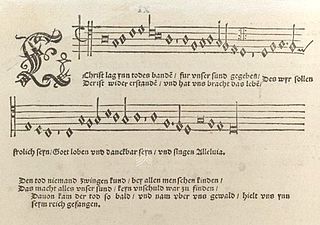
An die ferne Geliebte, Op. 98, is a composition by Ludwig van Beethoven written in April 1816, setting poetry by Alois Jeitteles.

Erika Pluhar is an actress, singer and author from Austria and was born on 28 February 1939 in Vienna.

Mahler Songs is a 40-minute studio album on which Gustav Mahler's Lieder eines fahrenden Gesellen, his Rückert-Lieder and two of the songs from his Lieder aus "Des Knaben Wunderhorn" are performed by Frederica von Stade and the London Philharmonic Orchestra under the direction of Andrew Davis. It was released in 1979.
Volkslied is a genre of popular songs in German which are traditionally sung. While many of them were first passed orally, several collections were published from the late 18th century. Later, some popular songs were also included in this classification.

Marie Leopoldine Blahetka was an Austrian pianist and composer.

Doris Inge Wegener, better known by her stage name Manuela[manuˈeːla], was a German singer.

Eyn geystlich Gesangk Buchleyn, sometimes called First Wittenberg Hymnal and Chorgesangbuch, was the first German hymnal for choir, published in Wittenberg in 1524 by Johann Walter who collaborated with Martin Luther. It contains 32 sacred songs, including 24 by Luther, in settings by Walter for three to five parts with the melody in the tenor. Luther wrote a preface for the part books. The collection has been called the root of all Protestant song music.

Dieter Kalka is a German writer, songwriter, poet, dramatist, musician, editor, translator and speech therapist.
Katrin Hattenhauer is a German painter and civil rights activist. In the late 1980s she was a member of the GDR-opposition movement. On 4 September 1989 she demonstrated "For an Open Country with Free People", marking the beginning of the Monday demonstrations in Leipzig. Her paintings and social sculptures have been exhibited in Europe.

Sonja Kehler was a German actress and chanson singer, known internationally for her interpretation of works by Bertolt Brecht, first playing his characters on the theatre stage, then focused on singing his songs and those of others in solo programs. She also taught acting in Danish at the theatre academy in Odense, appeared in films, worked as stage director and presented literary programs.

"Der Mond ist aufgegangen" is a German lullaby and evening song by Matthias Claudius, one of the most popular in German literature. Also known under the name Abendlied it was first released in Musen-Almanach in 1779, published by Johann Heinrich Voß. In 1783, Claudius published the poem with a modification to verse six in Asmus omnia sua secum portans oder Sämmtliche Werke des Wandsbecker Bothen IV. Theil.

Werner Schneyder was an Austrian kabarett performer, journalist, writer, actor, stage director, television presenter and sports reporter. He performed political kabarett with Dieter Hildebrandt from 1974 to 1982, with an extra program presented in Leipzig, then in the GDR, in 1985. He moderated das aktuelle sportstudio on ZDF from 1975, and a series about boxing for RTL from 1992 to 1999. He described himself as a Universaldilettant.
Gertraud Geißler is a German pianist and university lecturer for piano playing and co-repetition at the Hochschule für Musik Carl Maria von Weber Dresden. In 1978 she won the Robert Schumann Prize of the City of Zwickau.

Roswitha Trexler is a German operatic soprano and mezzo-soprano who became internationally known especially as an interpreter of the music of Hans Eisler and for her commitment to avantgarde vocal music.
Helga Glöckner-Neubert was a German writer.
Inge Lammel, née Rackwitz was a German women musicologist, which dealt mainly with industrial folk music. She fled to Great Britain as a Jew in 1939 and became known for her work on the persecution of the Jews during the period of National Socialism in Berlin-Pankow.
Wir sind des Geyers schwarzer Haufen is an interwar-era German marching song. Composed around the 1920s, the lyrics of the song are sourced from the poem Ich bin der arme Konrad by the Bavarian poet and artillery officer Heinrich von Reder. The melody of the song is arranged by German songwriter and Nazi Fritz Sotke. As a song about the German Peasants' War, the song lyrics are noted for their strong anti-clerical and anti-noble themes.
Monika Rinck is a German writer.
Regina Werner-Dietrich as Regina Werner) is a German operatic soprano and vocal pedagogue. She is professor emerita of classical singing at the University of Music and Theatre Leipzig.

Elisa Johanna Lucie Schlott is a German actress. Her younger half-sisters are the actresses Emilia Pieske and Helena Pieske.












